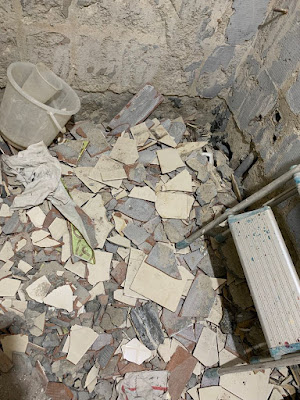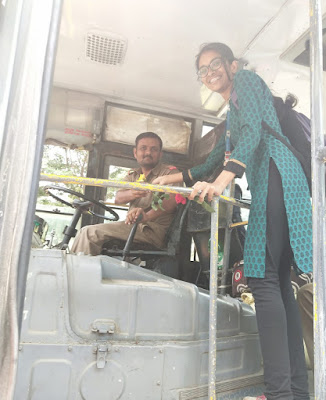Today(17/11/21) on behalf of RBE, gave essential groceries and toiletries, to a family as the male member, a covid recovered, is unable to work, due to covid related complications, even after treatment. These items were donated by Ms Preethi Bhongir. RBE wishes to thank her, for her generosity.
Sustainability Transformation Advisory and Guidance
Evangelising Sustainability amongst Large, Medium, Small and Tiny manufacturers and Service Providers. More focussed in India and advising Organisations on various steps to be taken amongst their Supply Chain Partners. The need of triple bottom line and the need to create awareness, both internal and external is the thrust area and objective of this initiative.
Wednesday, November 17, 2021
"What could be done and what are we doing" with household construction debris ... and similarly on factory waste
It will be great, if School children could send articles on what could be done with household construction debris. I am certain, they can think out of the box and not fear whether it could be executed or not.Engineering students and senior school children can send their opinion on what is that one could do regarding factory waste
Do Post
Thursday, June 6, 2019
Rotractors of Rotary Bangalore East at Maharani Arts Commerce and Management for Women say NO to Noise Pollution
Program was conducted on 25th May in Bangalore and Principal, Professors and Rotractors participated when they sensitized publice and various stake holders with regards to Noise Pollution.A write up from google search is for academic interest. The public received the effort well and appreciated.
Thanks to https://en.wikipedia.org/wiki/Noise_pollution
"Noise pollution, also known as environmental noise or sound pollution, is the propagation of noise with harmful impact on the activity of human or animal life. The source of outdoor noise worldwide is mainly caused by machines, transport (especially planes) and propagation systems.[1][2] Poor urban planning may give rise to noise pollution, side-by-side industrial and residential buildings can result in noise pollution in the residential areas. Some of the main sources of noise in residential areas include loud music, transportation noise, lawn care maintenance, nearby construction, explosions, or young people yelling (sports games). Noise pollution associated with household electricity generators is an emerging environmental degradation in many developing nations. The average noise level of 97.60 dB obtained exceeded the WHO value of 50 dB allowed for residential areas.[3] Research suggests that noise pollution is the highest in low-income and racial minority neighborhoods.[4] Documented problems associated with urban environment noise go back as far as ancient Rome.[5]
"Noise pollution, also known as environmental noise or sound pollution, is the propagation of noise with harmful impact on the activity of human or animal life. The source of outdoor noise worldwide is mainly caused by machines, transport (especially planes) and propagation systems.[1][2] Poor urban planning may give rise to noise pollution, side-by-side industrial and residential buildings can result in noise pollution in the residential areas. Some of the main sources of noise in residential areas include loud music, transportation noise, lawn care maintenance, nearby construction, explosions, or young people yelling (sports games). Noise pollution associated with household electricity generators is an emerging environmental degradation in many developing nations. The average noise level of 97.60 dB obtained exceeded the WHO value of 50 dB allowed for residential areas.[3] Research suggests that noise pollution is the highest in low-income and racial minority neighborhoods.[4] Documented problems associated with urban environment noise go back as far as ancient Rome.[5]
High noise levels can contribute to cardiovascular effects in humans and an increased incidence of coronary artery disease.[6][7] In animals, noise can increase the risk of death by altering predator or prey detection and avoidance, interfere with reproduction and navigation, and contribute to permanent hearing loss.[8] While the elderly may have cardiac problems due to noise, according to the World Health Organization, children are especially vulnerable to noise, and the effects that noise has on children may be permanent.[9] Noise poses a serious threat to a child’s physical and psychological health, and may negatively interfere with a child's learning and behavior.[10]"
Tuesday, May 28, 2019
Why waste unused note book pages?
A quick look at as to how Sustainability could be deployed when one takes a quick glance of empty pages of note books at the end of the year left as waste by students in Schools and Colleges. If the empty sheets could be collected and recycled to be bound and
used as note books and writing pads, sure one would do their bit towards the
path to Sustainability.
Photo Acknowledgement and thanks to Lukas https://www.pexels.com/photo/blank-book-bindings-business-communication-627530/
Monday, May 20, 2019
SMEs and SDGs
Strongly feel MSMEs are the pillars and SDGs can only be achieved if SMEs are in sync with the initiatives, well trained, motivated and incentivized. MSMEs worry whether their cost will go up and they become non competitive and their returns go for a toss. The Social, Environmental challenges which threaten have long term impact and need to bring in awareness and MSMEs should prioritize the Goals and choose focused areas out of 17 SDG Goals. MSMEs need tools to continuously monitor their progress in this area and the large Industries should recognize the same and practice, document and review the SDG initiatives. MSMEs participation will be felt in all 17 SDG’s when the entire supply chain follows standards like ISO 20400, ISO 26000 and versions in line with GRI suitable for MSMEs should start emerging with easy to do tools.
With nearly 50 million MSMEs in India including both registered and not registered and in various sectors viz., manufacturing, servicing, IT, food , logistics, pharma etc., subject matter experts with the help of large Industries should start proving inputs which will in fact give the MSMEs short, mid and long term benefits while they create best practices towards achieving their Goals
Saturday, May 18, 2019
Sustainability - Internal, Right away
When I began my journey evangelizing organization’s internal
and external ecosystem towards adapting sustainability as a focus, many asked
me if they would loose out to those who weren’t practicing sustainability. They
argued that organizations, which do not follow sustainability, will have lower
costs and hence will have an advantage on pricing. This question, for me, was
extremely thought provoking.
Trusting a business is not just about the price. It is a
combination of an organization’s intent and top management’s motivation to
positively have their sustainability policies in place. Cost and non-Cost
criteria initiatives, taken at various points towards sustainability practices,
need to be campaigned aggressively towards the entire supply chain ecosystem.
The process involves all departments (including admin,
Finance etc.) and vendors – it could be with reference to Green Buildings, Wind
& Solar energy, Organic Way, Reduction in paper use, Recycling, anti-child
labour policies etc. Most importantly the organization needs to be determined
to articulate these as policies.
The larger challenge however is with the small and medium
manufacturers and service providers. It is difficult to get them to practice and adapt these
processes because we need to first help them overcome their mind-block and
worry that these initiatives will increase cost. This requires reassurance and
training by large industries. MSMEs should take pride in talking about their
initiatives and demanding credit and acknowledgement for their sustainability
practices.
ISO standards like ISO 20400:2017 for sustainable
procurement guidance and ISO 26000 for Social Responsibility guidance will
guide the enterprise well.
Subscribe to:
Comments (Atom)












